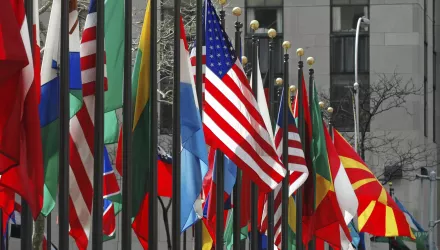In what one Dutch official called the “most important deliverable from the Summit,” thirty-five nations, led by the host governments of the Nuclear Security Summits in Washington, Seoul, and The Hague, announced today their commitment to strengthen nuclear security implementation.
The states committed to:
| The Belfer Center's William H. Tobey (center) at the 2014 Nuclear Security Summit in The Hague. (2014 NSS photo) |
- Subscribe to IAEA principles and recommendations for securing nuclear and radiological material and to implement procedures that meet or exceed those objectives;
- Continue to improve the effectiveness of their nuclear security through self-assessments and periodic peer reviews, with action based on those reviews; and,
- Ensure that those individuals with accountability for nuclear security are “demonstrably competent.”
Additionally, the subscribing states committed to improve nuclear security through “one or more” additional actions, including:
- Contributing to the development of IAEA nuclear security guidance documents;
- Providing bilateral or multilateral technical support;
- Maintaining and improving domestic and regional training activities;
- Sharing “good” practices;
- Providing experts for IAEA International Physical Protection Advisory Service missions;
- Developing and enhancing cyber security measures;
- Making donations to the IAEA Nuclear Security Fund; and,
- Supporting or participating in the development of World Institute for Nuclear Security best practice guides and training activities.
This is a small but significant step toward building an international commitment to a specific minimum standard for securing material that could be made into nuclear weapons. More than half of the Hague Summit’s participants subscribed to the commitment.
The statement also advanced important principles such as continuous improvement, self-assessments and peer review, and the need for demonstrable competence by those responsible for the security of nuclear facilities and material.
The key organizations that will facilitate implementation of these commitments are the IAEA’s Nuclear Security Division, which develops recommendations and guidance through its Nuclear Security Series, and the World Institute for Nuclear Security, which promotes sharing and implementation of best practices and which will soon launch a virtual academy to train and measure the professional competence of nuclear security professionals – a key path to fulfilling the “demonstrable competence” goal of the Summit initiative.
While the list of states subscribing to the initiative was impressive, so was the list of states which declined to do so, notably including China, India, Pakistan, and Russia. Convincing these and other non-signers to join the initiative should be a central priority in the lead-up to the next Nuclear Security Summit in 2016.
Tobey, William. “Committing to Excellence in Nuclear Security.” March 25, 2014



